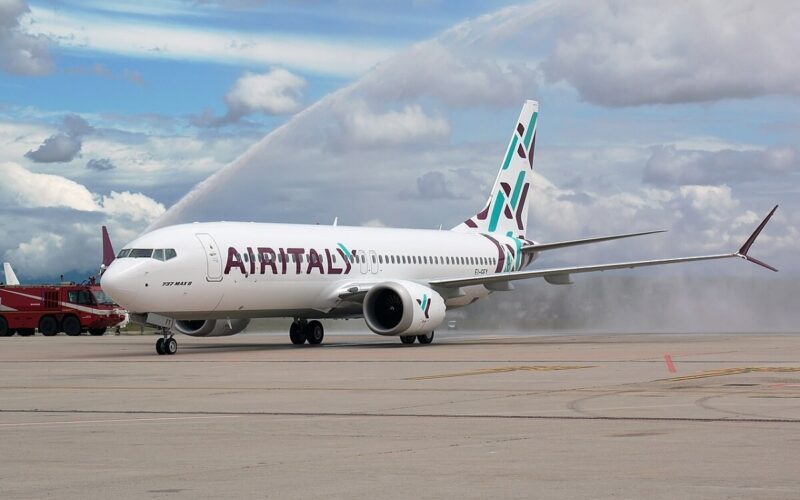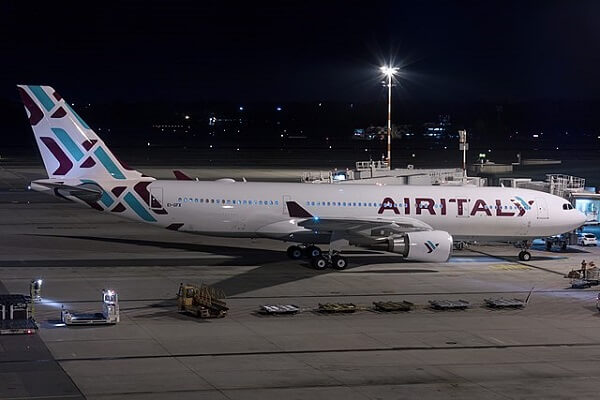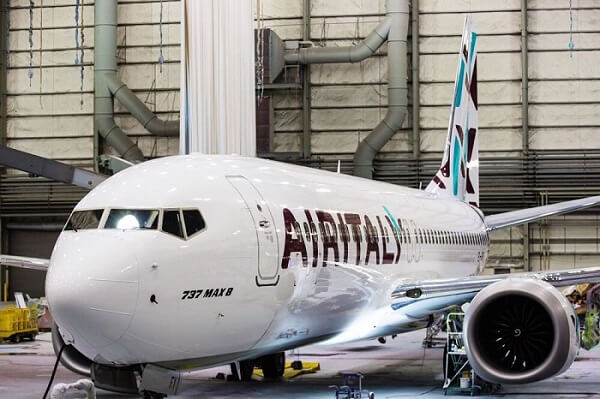When Air Italy, the country’s second largest airline, announced early in December 2018, its plans to launch flights to Los Angeles and San Francisco, U.S. legacy carriers responded in outrage. What they see behind the small Italian carrier, formerly known as Meridiana, is the guiding hand of Qatar Airways, Air Italy’s current co-owner. Although Qatar has been investing into a range of foreign airlines for years now (most recently − China Southern), its involvement in Air Italy’s activities struck a chord within U.S. industry giants reaching as far as the chambers of the U.S. Senate.
The Italian carrier’s aggressive expansion has raised concerns that the Qatari government had violated its Open Skies agreement with the U.S. through its Air Italy investment.
On December 5, 2018, Air Italy announced it would double its destinations across the U.S. from two to four, adding Los Angeles and San Francisco on the West Coast of the U.S. on April 3 and April 10 of 2019, respectively.
The new routes were an addition to the five intercontinental destinations it had already began serving in the second half of 2018 from its main hub at Milan Malpensa Airport (MXP), including Bangkok (Thailand), Delhi and Mumbai (India), as well as New York and Miami.
Less than two weeks later, on December 17, 2018, Air Italy announced direct flights to Toronto (Canada), followed by plans to launch new service to Chicago (U.S.) revealed the next day; direct flights on these routes are scheduled to start on May 6 and May 13, 2019, respectively.
According to Air Italy’s official press release announcing the Chicago route, “the new service is part of Air Italy’s rapid network expansion out of its Milan Malpensa hub […] alongside its ambitious growth plan for the next three years”. Those ambitions have been made clear from the very beginning.
Air Italy’s entry into this [U.S.] crowded market appears consistent with Qatar Airways pattern on adding subsidized capacity in markets where demand is already well served, – Letter to the U.S. government
Air Italy surfaced when, in February 2018, the Italian airline Meridiana merged with its subsidiary, the old Air Italy, taking up its brand. Having acquired a 49% stake in Air Italy the previous year, Qatar Airways became the carrier’s second biggest shareholder. Under its new owners, the airline stated it would seek to grow its fleet and passenger numbers fourfold by 2022, having a goal to replace Alitalia as the country’s new national carrier.
But with Air Italy’s expansion plans, the U.S. big three – American Airlines (A1G) (AAL) , United and Delta – claim to see a bigger picture. They see Qatar Airways’ aggressive strategy of expansion into the U.S. market, out of Air Italy’s newly established hub and enabled by new aircraft purchases. Otherwise, why (and how) would a small, loss-making and relatively unknown European carrier undertake such plans?
Qatar is using the tiny, close-to-defunct Air Italy to skirt its promise to the U.S. to not add so-called ‘Fifth Freedom’ flights to the U.S, – Delta Air Lines CEO Ed Bastian
This goes back to the long-lasting bad blood between the U.S. legacy carriers and the Middle East big three. American, United and Delta have long accused Qatar Airways (as well as Emirates and Etihad) of receiving government subsidies. According to the U.S. big three, the alleged state subsidies received by Qatar (and the UAE, where Emirates and Etihad are based) are in direct violation of the “fair competition” stipulated by the Open Skies agreements with the U.S.
Air Italy aircraft in its new livery (Image: Simone Previdi, CC BY-SA 4.0)
Proxy War by Qatar Airways?
A thaw in the long-running feud over unfair competition was seemingly reached at the beginning of last year when in January 2018, the President Trump’s administration and the Qatari government reached an agreement to settle the dispute on air transport issues between the two countries. At the time, it was hailed as a victory for the administration and a tribute to President Trump’s goal to protect American jobs.
Under the agreement, Qatar Airways was to commit to complete financial transparency and disclose detailed financial information of its state-owned enterprise. The carrier also pledged not to launch any more “fifth freedom” flights to the U.S., settling for routes that originated only from Qatar. A similar agreement was made between the governments of the U.S. and the UAE in May.
By exploiting its investment in Air Italy to create a loophole and dodge this pledge, Qatar has violated this [January 2018] agreement and the trust of the United States, - Scott Reed, Partnership for Open & Fair Skies
However, the long lasting feud seems to have been revitalized with Air Italy’s expansion plans. The carrier’s response to the outrage from the U.S. regarding the doubling of its network there was the announcement of plans to add even more routes (to Chicago and Toronto). Chief operating officer Rossen Dimitrov said the new route to the U.S. “reflects the importance of the North American market to us,” Forbes quotes him as saying.
The Partnership for Open & Fair Skies, a coalition representing Delta, United and American Airlines (A1G) (AAL) , among other aviation bodies, has advocated that Qatar Airways is behind the Italian carrier’s rapid expansion. United Airlines CEO Oscar Munoz have gone as far as saying that Air Italy is “The Italian version of Qatar,” Forbes quoted him as saying during a conference call with reporters earlier in December 2018.
The association, set up for the very purpose of campaigning against unfair competition by the Gulf-based carriers, maintains that Air Italy is being fueled by government subsidized money and that it is a violation of the January 2018 agreement between the U.S. and the Qatari government on “fifth freedom” terms.
“By exploiting its investment in Air Italy to create a loophole and dodge this pledge, Qatar has violated this agreement and the trust of the United States […] We expect the Trump administration will take strong action and stand up for American workers in response to these violations,” said Scott Reed, campaign manager for the Partnership for Open & Fair Skies in an official statement released on December 6, 2018.
A few days prior to that statement, a group of U.S. senators (led by Senator Ted Cruz) voiced their concerns in a letter sent to President Trump’s administration, calling the U.S. government to step in: “Air Italy’s entry into this crowded market appears consistent with Qatar Airways pattern of adding subsidized capacity in markets where demand is already well served,” the statement dated December 3, 2018, reads.
“Without funding from Qatar Airways, Air Italy would be unable to launch its new service, just as Qatar Airways would not be viable without direct support from the Qatari government,” the statement concludes.
Qatar Airways and its counterparts − Emirates and Etihad − have always denied they have been unfairly aided with state subsidies. “We are registered in Italy and not subsidized by Qatar Airways, who are minority stakeholders,” Dimitrov said at an event in Delhi to launch new services to India. “They do not manage us,” Forbes quotes him as saying.
Tug of War with the U.S.
On December 21, 2018, a column by Delta‘s CEO Ed Bastian entitled “Air Italy’s Mysterious Benefactor” appeared on Delta’s website. In the column, Bastian suggested that the “obscure” Italian airline is being funded by Qatari state subsidies and that Qatar is using the airline to bypass its agreement with the U.S.
“Qatar is using the tiny, close-to-defunct Air Italy to skirt its promise to the U.S. to not add so-called ‘Fifth Freedom’ flights to the U.S,” Bastian writes, highlighting Air Italy’s financial losses, which he states “is one of the worst performing airlines in the history of the airline industry with over $2 billion of operating losses over the past three years”. The CEO also turned to Qatar Airways performance, implying the carrier would not “exist” without the state subsidies.
Delta CEo Ed Bastian (Image: Delta News Hub, CC BY 2.0)
According to Bastian, Qatar’s foul play puts the U.S. airline industry and airline jobs in jeopardy. “These Italian routes, already highly competitive and well-served by existing carriers, are simply not economically viable without Qatari subsidies. By flooding these markets with subsidized capacity and dropping prices far below cost, Qatar is launching another assault on U.S. airline employees and travelers, and disrespecting the Administration,” his column reads.
On Air Italy’s new aircraft purchases, Bastian maintains that Qatar Airways has been providing the carrier with “billions of dollars’ worth of new airplanes including Boeing 787 and 737 jets, with plans to deploy larger Boeing 777 and A350s as well.”
Air Italy has started out with only 16 aircraft in its fleet. As of December 2, 2018, it operates 10 Boeing 737 aircraft (six 737-800s, one 737-700 and three 737 MAX 8s), with one Boeing 767-300 and five Airbus A330-200, Planespotters.net data indicates.
Air Italy’s first Boeing 737 MAX 8 delivered to its Milan Malpensa base in May 2018 (Image: Boeing)
A 22.7 year Boeing 767-300 has been moving between (original) Air Italy and Meridiana’s fleets since 2012. Leased Boeing 737s also remember Meridiana times, with an exception of three brand new MAX 8s, that the newly re-branded carrier received throughout 2018, also with a lessor’s help.
Five Airbus A330s, average age of 15 years, are leased from Qatar Airways and have reached Air Italy’s fleet throughout 2018, with the latest one arriving at the very end of October 2018. These have been deployed on Air Italy’s new long-haul routes, including those in the U.S.
The Italian affairs
Qatar Airways’ Middle Eastern rival Etihad was the first to land in Italy. In 2014, Etihad bought a 49% stake in Alitalia, heavily investing (about $2 billion) into the struggling Italian airline before it eventually entered into administration in May 2017. The Italian government has so far failed to find buyers for Alitalia, which continues to operate thanks to government loans.
Meridiana Boeing 737-800 (Image: Anna Zvereva, CC BY-SA 2.0)
With Qatar’s new Italian endeavor, it seems Delta might be turning from the written word to action. A November 1, 2018, report by Bloomberg on the potential bidders in Italy’s national carrier indicated the UK-based EasyJet and Delta had expressed interest in Alitalia. Although the speculation has been hush-hush so far, La Stampa reported on January 5, 2019, that a meeting with Delta’s managers is planned the following week, as well as another one with Lufthansa (LHAB) (LHA) by mid-January.
Alitalia’s bridge loan financing was due to expire in December 2018, and according to the newspaper, Italian state railway company Ferrovie dello Stato, previously mentioned as another potential bidder, has now taken over the negotiations on the future of the ill-fated carrier. The Italian government is reportedly expecting an agreement with the new shareholders to be reached by the end of February, La Stampa wrote, citing an unidentified official familiar with the matter.
Certainly, if Delta was to buy a stake in Alitalia, it would focus on long-haul operations. As such, an investment by the U.S. legacy carrier into the Italian airline would allow to challenge Qatar’s Air Italy advances.





-1.jpg)